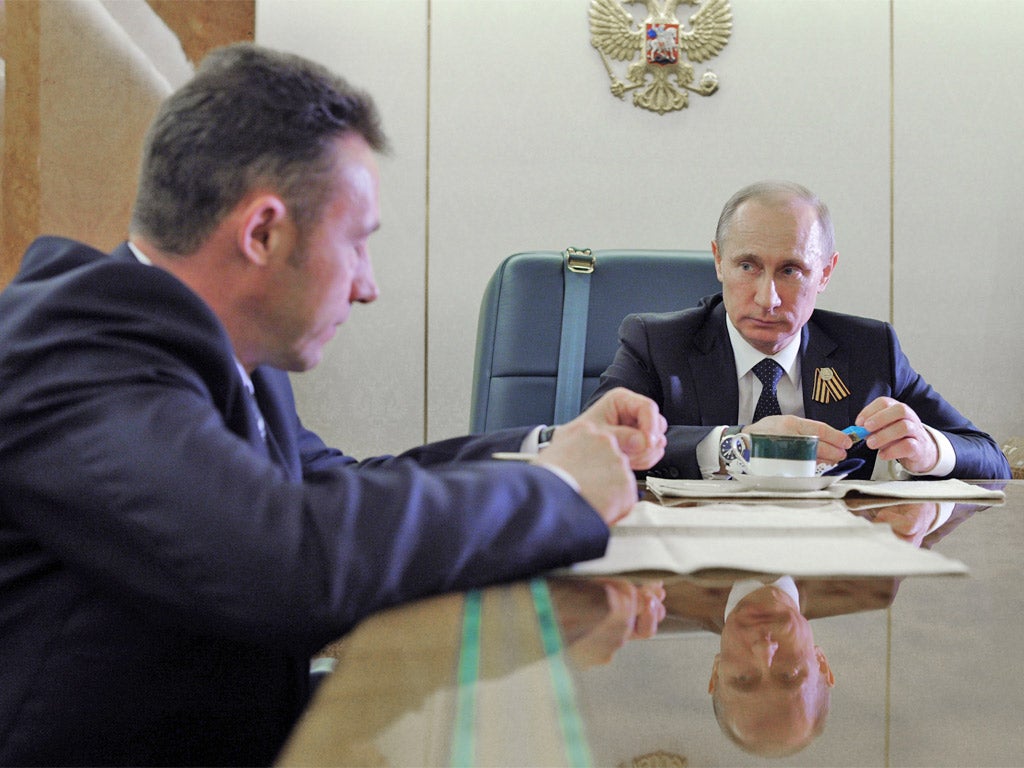Vladimir Putin makes tank factory foreman special envoy to the Urals
42-year-old who backed President's crackdown on dissenters during TV phone-in gets his reward

Your support helps us to tell the story
From reproductive rights to climate change to Big Tech, The Independent is on the ground when the story is developing. Whether it's investigating the financials of Elon Musk's pro-Trump PAC or producing our latest documentary, 'The A Word', which shines a light on the American women fighting for reproductive rights, we know how important it is to parse out the facts from the messaging.
At such a critical moment in US history, we need reporters on the ground. Your donation allows us to keep sending journalists to speak to both sides of the story.
The Independent is trusted by Americans across the entire political spectrum. And unlike many other quality news outlets, we choose not to lock Americans out of our reporting and analysis with paywalls. We believe quality journalism should be available to everyone, paid for by those who can afford it.
Your support makes all the difference.Igor Kholmanskikh is more used to the grimy workings of the factory floor than the gilded halls of the Kremlin, but the 42-year-old foreman is now in charge of the vast Urals region, after a surprise move by Vladimir Putin, who returned to the presidency a fortnight ago.
He announced Mr Kholmanskikh's appointment even before the new cabinet line-up was finalised over the past two days, giving a very clear signal to the urban, middle-class Russians who have come on to the street to protest in recent months about how he viewed their complaints.
Mr Kholmanskikh became famous when he appeared on a live televised phone-in with Mr Putin last year and offered to bring his factory co-workers to Moscow, and deal with growing street protests. "If the police can't handle it, then me and the lads will get over there and defend stability," Mr Kholmanskikh said ominously, flanked by his colleagues in their factory uniforms.
After his outburst on the phone-in, Mr Kholmanskikh was drafted in as a regular fixture at campaign rallies for Mr Putin, designed to boost the leader's image as appealing to ordinary Russians, and portray the protesting Muscovites as a spoiled minority. After he was re-elected, Mr Putin made Nizhny Tagil, the grim Urals city that hosts Mr Kholmanskikh's Uralvagonzavod plant, his first trip.
But nobody saw Mr Putin's next move coming. The worker has a degree in wheeled vehicles and is in charge of tank assembly at Uralvagonzavod, which produces both military and civilian vehicles, but has no political experience. Mr Putin said this did not matter, even though Mr Kholmanskikh will now be in effective charge of one of Russia's most important regions.
"I think that for you, a man who has spent his whole life at the plant, who understands the lives of ordinary people, it will be right to take this post. You will be able to protect the people's interests," said Mr Putin. "It definitely won't be easy," admitted Mr Kholmanskikh. "I hope I'll be up to it."
With the shock appointment Mr Putin has signalled exactly what he thinks of the swelling protest mood, and dismayed those who were hoping that he might rule in a more concessionary tone during what is essentially his fourth term as leader of Russia.
Mr Putin, who served two terms as President starting in 2000, stepped aside to become Prime Minister for four years in 2008, but returned as President after winning 63 per cent of the vote in March, and was sworn in earlier this month. The new cabinet is mainly made up of old faces and headed by Dmitry Medvedev, who warmed Mr Putin's presidential seat for the past four years. At a solemn session in the Kremlin when Mr Putin announced the new positions, he told his cabinet they faced "difficult work" ahead.
A protest on the day before Mr Putin's inauguration, saw tens of thousands of Muscovites rally, and for the first time there was serious violence, with a minority of protesters fighting back when the riot police attempted to detain them. Two opposition leaders – anti-corruption blogger Alexei Navalny and the radical leftist Sergei Udaltsov – were given 15-day jail sentences. The next major protest is set for 12 June.
Join our commenting forum
Join thought-provoking conversations, follow other Independent readers and see their replies
Comments